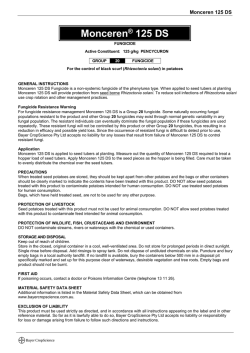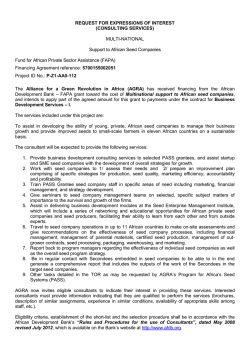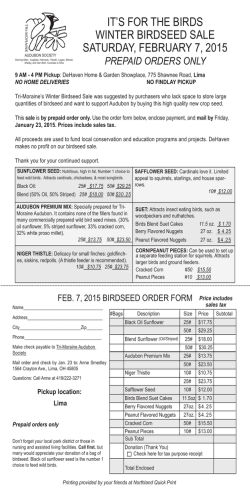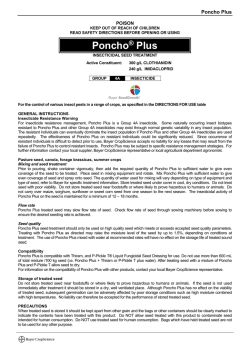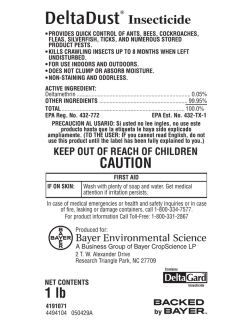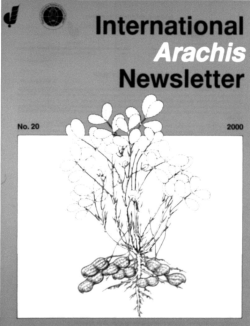
Planting Timetable for the Shenandoah Valley
CARE SHEET Asparagus Seeds: March 15–April 21 Crowns: April 28–May 30 Beans Green, Bush or Pole: Seed May 1–July 30 (for steady harvest, plant every 3 weeks) Lima or Dry, Bush or Pole: Seed June 1–July 15 Beets Seed March 15–May 21 & July 21–August 21 Broccoli and Cauliflower Transplant to Garden: March 29–May 21 & August 1–September 7 Cabbage Transplant to Garden: March 29–April 13 & July 7–August 21 Carrots Seed: April 7–May 21 & July 21–August 21 Corn, Sweet Seed when soil temperature is 50°–55° F and when Maple leaves are ½” long. Usually around May 10– July 21 Cucumbers Seed: May 15–June 11 Eggplant Transplant: after May 15 Melons (Cantaloupe & Watermelon) Seed or Transplant: May 10–June 15 Okra Seed or Transplant: May 15–June 15 Onions Seed or Transplant Sets: March 10–May 26 Peas English or Green: Seed March 7–May 7 & July 7–August 15 Southern/Cowpea/Black Eye: seed May 1–June 1 Peppers Transplant: May 15–June 11 Potatoes Plant Seed Potatoes: March 17–May 21 Pumpkins & Squash Seed: May 15–June 15 (after any danger of frost) Spinach & Other Greens Seed or Transplant: March 15–May 21 & July 21–August 21 Sweet Potatoes Transplant: May 15–July 1 Tomatoes Transplant: May 10–June 15 Lettuce Leaf: seed March 25–April 21 Head: transplant April 1–May 1 NOTE: These are average “safe” dates in this area. Adjust earlier or later with proper precautions. Reference: Jeff Ishee and The Daily News Leader; Southern Exposure Seed catalogue. (540) 943-8408 48 Milmont Drive, Waynesboro, VA 22980 www.Milmont.com ©2013 ORGANIC GARDENERS Time Your Planting to Avoid Pests Cabbage Cabbage Looper Start seed indoors ............. February 19 Transplant ................... April 2 – April 9 Cabbage Maggot By delaying planting until after yellow rocket (wild mustard) has bloomed, you can avoid these maggots. Corn Sweet Corn Earworm Plant early maturing varieties as early as possible to avoid sharing your corn. Consider starting your corn indoors in peat pots and then transplanting, pots and all. Corn won’t germinate in cool soil, but can tolerate some cool weather while growing. Peppers Pepper Weevil Start seed indoors ........................ April 9 Transplant ................... May 28 – June 4 Potatoes Colorado Potato Beetle (CPB) European Corn Borer NOTE: If corn usually suffers from both the earworm and the corn borer, choose the timing that will beat your most troublesome pest. Direct seed ……….…………. May 28 NOTE: At the end of the season, get your peppers out of the garden as fast as possible. Allowing the plants to linger will invite future weevil problems Direct seed potatoes ......... May 28 – June 4 NOTE: By delaying planting seed potatoes until May 28th to June 4th, you could discourage this defoliating beetle! Adult CPBs emerge from soil in early spring. Plant fast-maturing varieties like Yukon Gold, Caribe, Superior, Bison, Dark Red Norland, Katahdin, or Northgold Russet so the tubers will be a good size when the second generation of beetles emerges in midsummer. Some leaf chewing by beetles (who only eat the above-ground growth) at that point won’t hurt your harvest. To Avoid Knot Nematodes in Broccoli, Cauliflower, Lettuce & Other Greens Broccoli & Cauliflower Start seed indoors ............ February 19 Transplant ............... April 9 – April 16 Lettuce & Other Greens Start seed indoors ......... March 19 Transplant .......................... April 16 NOTE: These tiny, eel-like creatures feed on the roots of almost all veggies and are especially problematic in the warm, sandy soil of southern and coastal regions. Affected plants look weak and sickly. Their roots are covered with galls (knobby, abnormal growths.) To avoid this pest in the fall, delay lettuce, spinach and other cool-season plantings until the soil temperature drops below 64° F. Choose nematode-resistant varieties when possible. To Avoid Flea Beetles These jumpy little black beetles chew small, round holes in the leaves of many vegetables (such as brassicas, eggplant, potatoes, and tomatoes) and sometimes kill seedlings. If you've had flea beetles before, delay planting susceptible crops 1 or 2 weeks beyond normal planting times. Flea beetles overwinter as adults, then appear in the garden very early in the season. If food isn't there when they emerge, they won't lay eggs in the garden, which means fewer beetles later. Using transplants rather than direct-seeding can also help, as transplants can withstand flea beetle damage much better than young sprouts. Proper timing of planting and using inter-planting can help mix up the beetles. Sally Cunningham, author of Great Garden Companions, planted eggplants by themselves in one area of the garden, and inter-planted them with marigolds and basil in another part of the garden. The outcome − the solo eggplants were full of holes, but the others were camouflaged enough that they made it through the season undiscovered! Estimated Date of Last Frost: is May 15th ● Estimated Date of First Frost: is Mid-October
© Copyright 2026
